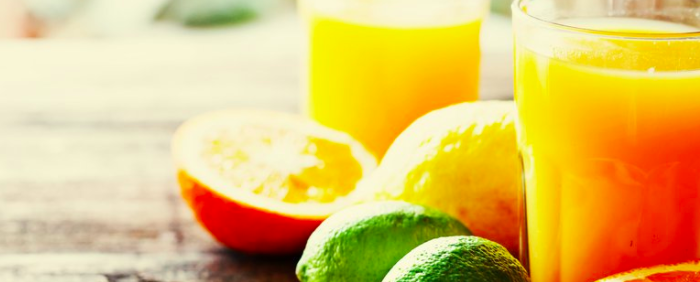
Are fruit and vegetable juices good or bad for our health?
Doctors and nutritionists urge their patients to eat more fruits and whole vegetables to benefit from all the nutrients. It is recommended to eat 5 to 10 servings of fruits and vegetables each day, but very few of us do.
Fruit and vegetable juice: a beverage too much calories?
That said, we should avoid systematically using fruit and vegetable juices to meet our nutritional needs. These juices are high in calories and do not contain the health benefits of vegetables and whole fruits. In an interview given to the daily La Presse, obesity expert Dr. Yoni Freedhoff bluntly states that “juice is liquid candy enriched with a few vitamins, nothing more. ”
It is easy to drink large volumes of juice, because they no longer contain fiber, which calms the appetite. For example, a fresh orange contains about 60 calories and 3 g of fiber, while 1 large glass of orange juice provides about 110 calories and less than 1 g of fiber. Beware of drinks and other fruit punches: these drinks do not have the same nutritional value as the fruit and contain mostly water and sugar, as well as various additives, but very little real fruit juice.
Of course, vegetable juices are generally less sweet than fruit juices. However, they are strongly added salt. We must read the labels carefully and choose the least salty juices. Like fruit juices, they do not provide fiber that is found in whole vegetables.
Warning about juices
According to a report by the American Academy of Pediatrics , babies should not be fed baby bottles until they are six months old, as this can prevent them from drinking enough milk. The infant lacks the essential elements for its growth and development. In addition, too much juice can cause diarrhea and promote cavities; it prevents, moreover, to gain weight. This remains true when the child grows up. On the other hand, he may find the sweet taste of the juice pleasant, but he does not profit from the beneficial effects of the whole fruit.
In addition, and although further scientific studies are needed to confirm the direct link between childhood obesity and fruit juice consumption, sugary drinks such as fruit juices and beverages may be an additional contributing factor to complex phenomenon of childhood obesity.
In conclusion…
After Quebec and Canadian media mistakenly reported that juices would be removed from Canada’s Food Guide, Health Canada reiterated that fruit juices are still among the choices to consider in a balanced, high-calorie diet. fruits and vegetables. Health Canada has stated, however, that “Canadians are encouraged to consume a variety of whole fruits and vegetables more often than juice, as juice can not provide some benefits, such as higher fiber intake.”
In short, while it is quite possible to eat fruit and vegetable drinks from time to time as part of a healthy diet, it is best to consume them in moderation. Whenever possible, consume whole fruits and vegetables and hydrate yourself with water, milk, tea, herbal teas and coffees.